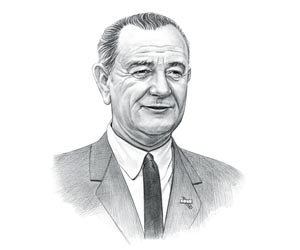|
|
|
|
|
The Civil Rights movement had launched voting registration campaign in Selma, Alabama and five months after the Selma Freedom Marches, President Lyndon B. Johnson sent a voting rights bill to Congress. The law had an immediate impact. By the end of 1965 250,000 new black voters had been registered. The original Voting Rights law was scheduled to expire five years after it was enacted, but it has since become a permanent federal law and has been extended and amended five times, the most recent amendment being the Reauthorization and Amendments Act of 2006. Facts about
Voting Rights Act of 1965 History: The 15th Amendment to the Constitution was passed in 1870 stating that a citizen's right to vote cannot be taken away because of race, the color of their skin. It initially achieved its purpose and black voting participation and representation in the Southern states increased rapidly. History: The Compromise of 1877 ended the Reconstruction era, the infamous Jim Crow Laws were introduced and the political gains achieved by African Americans were rolled back as blacks were prevented from voting by intimidation and violence from white supremacists and political tactics such as poll taxes, literacy tests and the grandfather clause. History: The Civil Rights Act of 1964 was signed into law on July 2, 1964. The law focused on segregation and employment discrimination but failed to fully address voting issues. History: The 24th Amendment was ratified January 23, 1964 addressing the issue of fair voting and barred Poll taxes, making it illegal to make anyone pay a tax to have the right to vote. But there were still many problems in relation to voting, African Americans made up almost half the population, but only 2% were registered voters. Members of organizations, such as the SCLC and the SNCC, were subjected to extreme acts of violence and intimidation as they intensified their voter registration efforts in the south. Selma, the seat of Dallas County, Alabama, had a record of violent resistance to black voting. The Selma marches were demonstrations surrounding voting issues and organized by Civil Rights leaders such as Dr. Martin Luther King and John Lewis. Five months after the last Selma March ended on 25 March 1965 , President Lyndon B. Johnson sent a voting rights bill to Congress to remove race-based restrictions on voting. Congress based its authority to regulate voting practices on the 15th Amendment, which gave all citizens the right to vote. The Voting Rights Act of 1965, also known as the VRA, contained 17 sections and was was signed into law by President Lyndon Johnson on August 6, 1965 in order to ban all kinds of racial discrimination in voting. The Voting Rights Act of 1965 made discriminatory practices illegal, and gave private citizens the right to sue in federal court to stop them. The Act of 1965 contained two types of provisions: "general provisions", which applied nationwide, and "special provisions", which applied to only certain states and local governments. The provisions of the Voting Rights Act of 1965 were initially aimed at the seven states in the South (Alabama, Georgia, Louisiana, Mississippi, North Carolina, South Carolina and Virginia) that had used literacy tests to obstruct registration by African Americans. The law called for these states to demonstrate progress, whilst submitting to federal oversight of voting changes. The passage of the Voting Rights Act of 1965 was a watershed event in the history of the United States because, for the first time, the federal government undertook voting reforms that had traditionally been left to the states. The act prohibited states from imposing or applying qualifications, standards or procedures to deny the right to vote on account of race or color. The act established a coverage formula under which federal intervention in the electoral process was permitted in states in which any test or device was used as a condition of voter registration. It also authorized the appointment of federal voting examiners. The act suspended the use of literacy tests in covered jurisdictions. It required that new voting laws in covered states and local jurisdictions were approved, before taking effect. Section 4 included the provision that a jurisdiction may terminate or "bailout" from coverage under the Act's special provisions providing the "bailout" applicant had demonstrated that there had been no violations of the voting discrimination during the past ten years. Congress also made it clear that the poll tax had precluded persons of limited means from voting and had denied the constitutional right to vote. The law prohibited any person from intimidating, threatening, or coercing any person for attempting to vote or voting. Each state has different rules regarding the effect of a criminal conviction on the right to vote and on regaining the right to vote if it has been lost. Amendments were made to the Voting Rights Act of 1965 in 1970, 1975, 1982, 1992, and 2006. The Justice Department enforces other voting rights laws: the Voting Accessibility for the Elderly and Handicapped Act of 1984, the Uniformed and Overseas Citizens Absentee Voting Act of 1986, the National Voter Registration Act of 1993 and the Help America Vote Act of 2002. The Voting Rights Act of 1965 enforced the voting rights guaranteed by the 14th and 15th Amendments to the U.S. Constitution, and resulted in the mass enfranchisement (endowing the rights of citizenship, especially the right to vote) of racial minorities throughout the country, especially in the southern states.. |
| US American History |
| 1945-1993: Cold War Era |
|
|
|
|
|
First Published2016-04-19 | |||
|
Updated 2018-01-01 |
Publisher
Siteseen Limited
| ||
|
|

